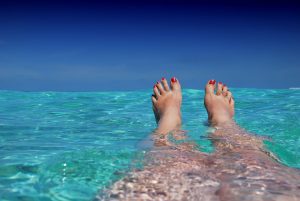 If you live in a cold climate, you know it’s the time of year when many people head for warmer locales. A week – or even less – in the sunshine can make you feel like a completely different person after months of freezing temperatures, snow and short days.
If you live in a cold climate, you know it’s the time of year when many people head for warmer locales. A week – or even less – in the sunshine can make you feel like a completely different person after months of freezing temperatures, snow and short days.
While a trip to the beach sure feels good, is there any evidence that vacationing is actually good for you? We took a broad look at the research to find out if there are any data that demonstrate vacations reduce stress, improve well-being or yield other measurable positive effects.
The best evidence comes from a systematic review published in 2009 that looked at the benefits of taking a vacation. The review found that vacations have positive effects on health and well-being, but that improvements fade several weeks after returning to work. The data raised more questions than they answered. Most of the subjects took their vacation in the summertime, not to escape cold weather. And little data was available on how vacationers spent their time. (Presumably, there is a difference between staying at home and traveling to a resort for your vacation.) The review concluded that additional research on the effects of vacations is needed.
Since the 2009 review, some additional studies have found benefits of vacationing. One published by Finish researchers in 2010 found that vacations can generally improve health and well-being. The study followed nearly 200 people who took winter sports vacations and long weekends away. Before, during and after the trips, the researchers measured six indicators: health status, mood, tension, energy level, fatigue and satisfaction. People in both groups – those who took weekend trips and longer vacations – reported higher levels of well-being during the vacation, but returned to their normal levels of well-being after the vacation.
Another single study, conducted by researchers in the Netherlands, measured the effects of vacations on happiness. The study yielded similar results – that vacations do improve happiness, but those improvements fade within a few weeks. But it came to another surprising conclusion: the act of planning a vacation yields a much larger boost in happiness – up to eight additional weeks of improved moods in anticipating the vacation.
It turns out, how you spend your time on vacation is important too. A 2016 study published by the University of Massachusetts Amherst surveyed more than 800 vacationers to determine whether vacations relieve stress or improve life satisfaction. The study identified some attributes of vacations that lead to stress relief. People who perceive they have control over their travel plans are more likely to feel less stressed after a vacation. Mastering a new skill and detaching psychologically from work during a vacation also help to reduce stress levels. The study also found that longer vacations provide more opportunities to achieve these goals, hence yield greater benefits.
What do all these findings mean? The most likely scenario is that your vacation will improve your well-being for a short time, but not lead to any long-term changes in your mood or happiness. But anticipating a vacation will buy you extra weeks of an improved mood. And – depending on how you spend your time away (especially if your vacation is longer) – you may see some long-term stress relief when you return.



It all depends on how you like to travel! I find i benifit from an improved mood before, during and after a vacation. Knowing how YOU like to travel is a huge benifit, i cant simply lay on a beach, i need to explore. Others however may want nothing but to lay on a beach. Informative article!